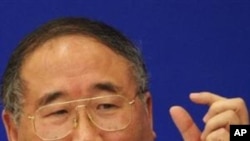One of China's top energy officials vows the country will continue working to reduce the growth of its carbon emissions - a promise made ahead of last year's United Nations climate talks in Copenhagen.
The vice chairman of China's National Development and Reform Commission, Xie Zhenhua, says the government has so far mainly tried to raise public awareness of energy conservation and environmental protection issues.
Speaking in Beijing Wednesday, he said China will incorporate more efforts to tackle climate change in its next five-year plan, which covers 2011 through 2015.
Xie says the government will rely more on legal tools to encourage society to change consumption patterns and what he described as "the economic development pattern."
He added that some of the targets on tackling climate change, such as reducing carbon emissions and increasing renewable energy, will be made mandatory.
He also stressed confidence in technological innovation and said Chinese companies are researching ways to upgrade the country's traditional industries.
Greenhouse gas emissions, such as carbon dioxide caused by burning fuels such as oil and coal, are thought to contribute to global warming.
A United Nations climate change meeting in Copenhagen last December broke up in acrimony, without a legally binding agreement on how to cut carbon emissions.
Xie Wednesday emphasized Beijing's position that in regard to reducing emissions, it is a developing - not a developed - country.
Xie says China still needs to continue its economic development to improve people's livelihoods. He describes it as a "mammoth task" to achieve development and protect the environment at the same time.
The Copenhagen talks broke down in part because nations could not agree on whether the larger developing countries such as China, should be required to cut emissions.
China is the world's biggest emitter of carbon dioxide, mostly from burning fossil fuels. Many Western governments want Beijing to firmly commit to capping its emissions.
Xie repeated calls for developed nations to "do more and do better" in taking the lead to substantially reduce energy use and pollutants. He also called on developed nations to provide financial and technological aid to developing countries to help them tackle climate change.
While China is increasing its use of alternative energy sources, such as nuclear and wind power, it continues to build new coal-fired power plants. The government's plan aims to cut the growth in emissions - by reducing the amount of energy used for each dollar of economic activity. But the plan allows overall emissions to grow along with the economy.
Next week, China, for the first time, hosts the long-running U.N. negotiations aimed at reaching a climate change agreement. The meeting in the city of Tianjin is seen as a stepping stone to major climate talks in Mexico later this year.




